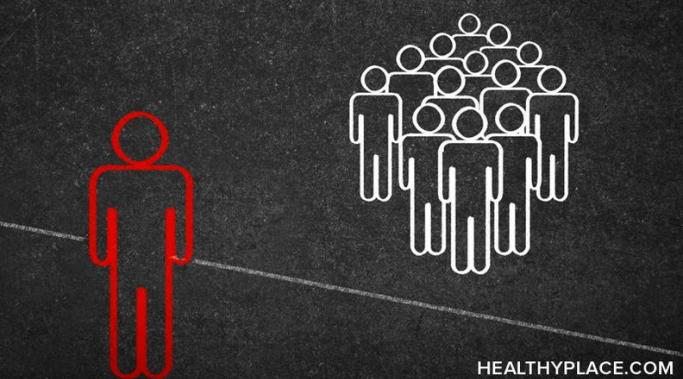Guilt. I hate that word. I hate the feelings that attach itself to it and the times in which I felt that my mental illness, the actions resulting from it, hurt other people. Hurting those I loved felt like the worse sort of guilt. Like being punched in the stomach and unable to breathe. Guilt is not just a word nor a feeling: When you live with a mental illness it can come to define your life. It can become dangerous.
Mental Health - Recovering from Mental Illness
I ask myself, "How much time alone is too much time alone?" on a regular basis. When it is 6 p.m. and I have been writing all day and have not left my house for more than thirty minutes to walk my dog. Or when it is 4 p.m. and I am exhausted because the sun has slipped away again and I'm getting sort of sad. Spending time alone, being able to be alone, is healthy. But when you live with a mental illness, spending too much time alone, well, take it from me--it gets pretty lonely.
I remember being a little girl--my hair was curly and my mother put pink ribbons in it. Apparently, I was pretty cute, but I'm certain it's a mothers blessing to honestly believe they have the best looking little ones. That aside, I remember a life in which I was not afraid of the future. I was excited! I had lots and lots of plans, some of them secret and some of them I told everyone I could.
When I grew up I wanted to be a doctor and an actress and as pretty as the babysitter who occasionally took care of my siblings and I. I was not afraid of the future; I was still young and pure as only children are. I had not yet been diagnosed with a chronic mental illness.
Picture this: you are sitting in your psychiatrist's office and you are probably tapping your foot, and watching while he or she takes notes--- quick and swift notes that seem to determine your fate. I don't think it's ever a comfortable situational, but it is, above all else, an important relationship. Yes, those sometimes irritating conversations in which we explain our damn feelings, well, that's part of our recovery.
I can think of a handful of things that have caused me trauma in my life, but being diagnosed with a chronic mental illness, bipolar disorder, is at the top of the charts. Those of us who live with a mental illness understand trauma on a deep level. We experienced trauma before our diagnosis, once finding out, and when working to become well again.
Mental illness is often connected to anxiety and its best bud insomnia. Often, it is believed to be a concurrent illness--connected to the primary diagnosis-- bipolar disorder for example. In my life it is hard to separate anxiety from insomnia. They invade my life together. Sometimes they hang around for a night or two and leave me in peace, and sometimes they signal something bigger. Relapse.
An Example of Insomnia and Anxiety...
It's been a fantastic Fall so far in British Columbia, Canada, where I dwell. It's nice and sunny and has made me smile. And now it is pouring rain. And I like rain, the sound of it hitting my skylights, but I do not like the slow change in my mood that never seems to forget about me each year. And each year, I am somehow surprised that Seasonal Affective Disorder (SAD) has slowly inched its way into my life---again-- and each year, my mood seems to fall along with the leaves.
Picture this: A moment ago I was staring at the blank text field going "Ummm...Uhhh...Dammit!" And then I was coughing a rather nasty cough that lives deep inside my chest and scratches my throat. I slowly move my hand toward cough drops which have proved to be generally useless. I have a headache and realize the Tylenol is downstairs. I wonder if I can make it downstairs.
A box of tissues sit beside me where my notebooks usually are. I look up "how long does a cold last?" Apparently, seven to ten days. I am on day three. The website recommends chicken soup. I hate soup. I then type in, fingers moving rather slowly: "depression related to the common cold" although this does not feel common --I think I might be dying. But I am sort of dramatic with these things...
I'm done telling about how crappy I feel (insert sneeze here) but I have always felt I suffer from depression when I am sick. Am I alone in this?
Do. Not. Apologize. For. Living. With. A. Mental Illness.
Remember that brand Nike and their slogan "Just Do It!" ? Well, "Don't Do It!" Instead, explain it.
"I've Met Someone New and Important, Shouldn't I explain?"
Okay. Take a minute and think about it. What comes to mind? Immediately, I think of when I was first diagnosed with bipolar disorder. And then I recall the years that followed: a feeling of loneliness that never seemed to leave me. A feeling I still struggle with. Even as I write these words and with the understanding that those who read them probably do understand. But it's not that easy--it never is.









